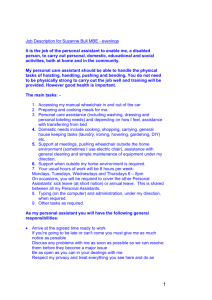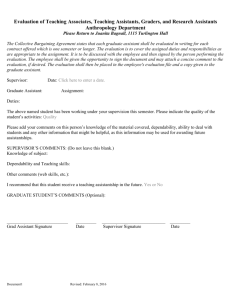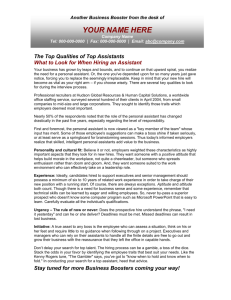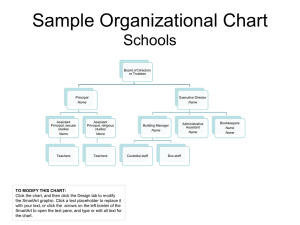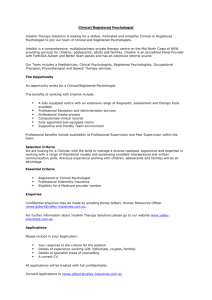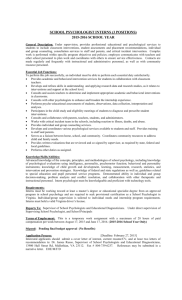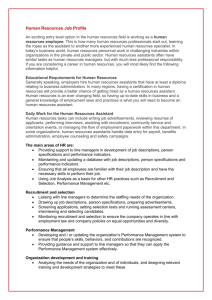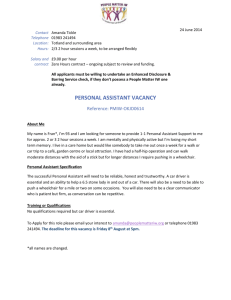Attached - British Psychological Society
advertisement
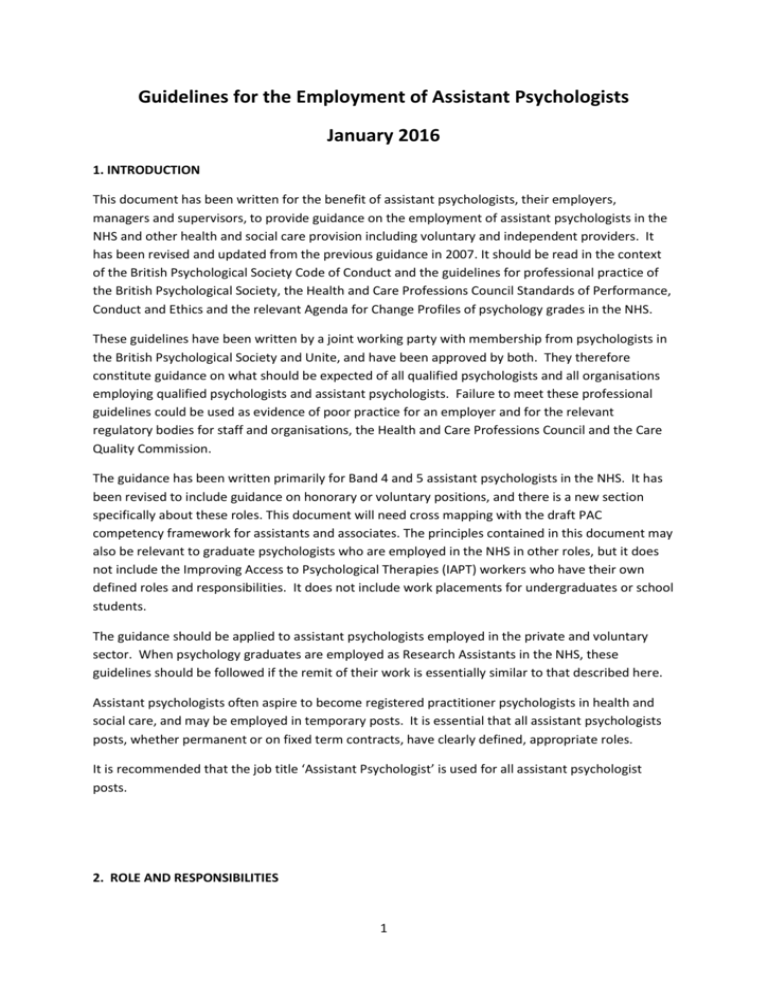
Guidelines for the Employment of Assistant Psychologists January 2016 1. INTRODUCTION This document has been written for the benefit of assistant psychologists, their employers, managers and supervisors, to provide guidance on the employment of assistant psychologists in the NHS and other health and social care provision including voluntary and independent providers. It has been revised and updated from the previous guidance in 2007. It should be read in the context of the British Psychological Society Code of Conduct and the guidelines for professional practice of the British Psychological Society, the Health and Care Professions Council Standards of Performance, Conduct and Ethics and the relevant Agenda for Change Profiles of psychology grades in the NHS. These guidelines have been written by a joint working party with membership from psychologists in the British Psychological Society and Unite, and have been approved by both. They therefore constitute guidance on what should be expected of all qualified psychologists and all organisations employing qualified psychologists and assistant psychologists. Failure to meet these professional guidelines could be used as evidence of poor practice for an employer and for the relevant regulatory bodies for staff and organisations, the Health and Care Professions Council and the Care Quality Commission. The guidance has been written primarily for Band 4 and 5 assistant psychologists in the NHS. It has been revised to include guidance on honorary or voluntary positions, and there is a new section specifically about these roles. This document will need cross mapping with the draft PAC competency framework for assistants and associates. The principles contained in this document may also be relevant to graduate psychologists who are employed in the NHS in other roles, but it does not include the Improving Access to Psychological Therapies (IAPT) workers who have their own defined roles and responsibilities. It does not include work placements for undergraduates or school students. The guidance should be applied to assistant psychologists employed in the private and voluntary sector. When psychology graduates are employed as Research Assistants in the NHS, these guidelines should be followed if the remit of their work is essentially similar to that described here. Assistant psychologists often aspire to become registered practitioner psychologists in health and social care, and may be employed in temporary posts. It is essential that all assistant psychologists posts, whether permanent or on fixed term contracts, have clearly defined, appropriate roles. It is recommended that the job title ‘Assistant Psychologist’ is used for all assistant psychologist posts. 2. ROLE AND RESPONSIBILITIES 1 Assistant Psychologists work under the clinical supervision of a registered practitioner psychologist, providing assistance and delivering assessments, interventions and training as directed. Tasks carried out by Assistant Psychologists may include: Assessment e.g. direct observations, formal psychometric testing, using semi-structured interviews Carrying out prescribed interventions with individuals and groups Developing and delivering workshops and training packages for individuals, carers and staff Writing appropriate reports Literature searches to determine best practice Support for service user and carer involvement in psychology services Audit and service evaluations Research Developing and disseminating information for service users, carers, colleagues, referrers and commissioners Assistant psychologists should not be required to: Carry out tasks over and above their level of competence. This is required by the British Psychological Society Code of Ethics and Conduct and the Health and Care Professions Council Standards of Performance, Conduct and Ethics Substitute for registered practitioner psychologist Undertake primarily administrative and clerical duties or the role of a care assistant or support worker Work alone without access to a qualified psychologist for advice and support Work without adequate and regular supervision from a qualified psychologist Work as the sole professional with complex cases or in emergency or crisis services Write reports for legal purposes It is the responsibility of the assistant psychologist’s manager and supervisor to ensure that they are not given work to do that is over and above their level of competence. Their caseload must be manageable and there should be regular reviews of the caseload. The manager must ensure that the assistant has sufficient supervision and training to enable them to carry out their duties. The manager should also ensure that the assistant psychologist has a realistic balance of work, reflecting their qualifications and experience, and their need to gain new experience. The balance of work should include time for supervision, administration, personal study and opportunities to meet with other psychologists. Band 4 and Band 5 Assistant Psychologist posts Assistant psychologists may be employed on Band 4 or Band 5 of Agenda for Change. The difference between the 2 bands may be summarised as: Band 4 Assistant psychologists must have a greater level of supervision and direct management by their line manager. All their work will be routinely checked in supervision. Band 4 Assistants will not develop or deliver teaching, training or advice to other staff: their role in training would be purely to assist a registered practitioner psychologist. Band 5 2 Assistants might help develop training programmes and would be able to deliver elements of a planned training programme Band 4 Assistants would not have research and development as a major part of their role but they might contribute towards research programmes being carried out by qualified colleagues e.g. through directed literature searches or data analysis Band 4 Assistants should not work with people in crisis or severe distress. Band 5 Assistants can work with people in crisis or severe distress, as long as they are not the sole practitioner and they are well supported by their supervisor and in a safe working environment Assistants would normally be employed as Band 5’s, because this band offers greater flexibility and independence in the role. They must always be employed at Band 5 in roles where there is not the constant presence of a registered practitioner psychologist for advice. However, Band 4 Assistants have much to offer where there is a very well defined and closely supervised role, working with less complex or serious cases. They can work effectively in a larger team of psychologists, where there are opportunities to progress to Band 5 with greater experience. 3. ACCOUNTABILITY AND RESPONSIBILITY Assistant psychologists will usually be directly managed by a registered practitioner psychologist, but may be managed by a non-psychologist manager. They must be professionally accountable to and supervised by a registered practitioner psychologist, who will be competent to ensure their practice. All clinical work carried out by an assistant remains the responsibility of the psychologist who line manages or clinically supervises them. This registered practitioner psychologist will assess all referrals and decide on treatments or interventions. The assistant psychologist will carry out prescribed assessments and treatments. All clinical notes, letters and reports should be checked and countersigned by a qualified psychologist. Letters and reports signed by the assistant must state ‘under the supervision of’ and give the name and contact details of the supervising psychologist. 4. RECRUITMENT Candidates for assistant posts should have an approved psychology degree and be eligible for Graduate Membership of the British Psychological Society: this should be included in person specifications. The British Psychological Society assures the quality of degrees that lead to eligibility for Graduate Membership. Advertisements for assistant posts must not imply that the posts offer recognised professional training in psychology, nor should there be any implication of the guarantee of subsequent entry to a recognised training course (unless this is true in specific local circumstances.) There must be a fair process for recruitment to assistant posts which complies with employment law, equality legislation and the employing organisation’s policies and procedures. A registered practitioner psychologist should be part of the recruitment team and selection panel for all assistant psychologist posts. It is recommended that service user representatives are also part of the selection panel. 3 All posts should have a clear job description and person specification, and should be clear about the salary, terms and conditions of service, and opportunities for training and development provided. Posts should be openly advertised. NHS jobs (http://www.jobs.nhs.uk) and the British Psychological Society (http://bps.org.uk) are the usual national sites for advertisements for assistant posts. Managers may also chose to advertise through their local media and the careers services of local universities. Employers may wish to state that they follow these Guidelines on the Employment of Assistant psychologists, as an indication of good employment practice. At least 2 references should be sought. Before assistant psychologists can start work, they will require Disclosure and Barring Service (DBS) checks and occupational health checks. 5. INDUCTION AND INTRODUCTION TO WORK All staff should undertake a formal induction, provided by their employing organisations. Their manager should also provide them with a written induction pack which gives them clear guidance about their role and responsibilities, and an induction to their workplace. They should be provided with the relevant statutory and mandatory training (e.g. fire safety, health and safety, safeguarding children and safeguarding vulnerable adults, confidentiality and record keeping.) They should be provided with information about their employing organisation, its policies, procedures and key contacts. They must be made familiar with safe working practices and emergency procedures. A structured induction to the members of the multidisciplinary team and their job roles should be provided, as well as facilitating introductions to other psychologists and assistants They must be informed about supervision arrangements and introduced to local professional support systems e.g. assistant psychologists’ peer groups. Assistant psychologists should be encouraged to attend peer groups for support and development. Some services provide ‘buddy’ systems for new starters, where a peer will meet and offer informal information and support to the new assistant. This is recommended as good practice, especially when the assistant is new to the area as well as new to the service. 6. SUPERVISION It is a requirement that assistant psychologists must receive supervision from a registered practitioner psychologist The British Psychological Society, Health and Care Professions Council and Care Quality Commission all have standards which require supervision for any work with service users in health and social care settings. The Care Quality Commission Core Outcome 14 (Supporting Workers) states that all staff must receive appropriate training, professional development, supervision and appraisal. Staff must be able to provide evidence that they meet the standards of their professional body and the Health and Care Professions Council requirements. The quality and arrangements for supervision should meet the good practice guidelines of the British Psychological Society. For full-time assistants there should be a minimum 2 hours per week uninterrupted formal supervision time. Band 4 assistants will require more supervision time. There should also be the 4 opportunity for informal, ad hoc supervision time. Part-time assistants may need a little less supervision time, but the arrangements must be sufficient to ensure that their work is properly scrutinised and that their development needs are addressed. Assistants should be able to contact a registered practitioner psychologist for advice within one working day. Cover arrangements for supervision should be in place if the regular supervisor is on leave or absent for any reason. If an assistant has a split post or more than one supervisor for other reasons, their main supervisor and line manager must be clearly identified. Supervision should include: A review of all cases regularly Review of work done since last supervision Plan of future work, both clinical and non-clinical with agreed priorities and deadlines Setting and reviewing of objectives Live supervision – opportunities for the assistant to observe the supervisor at work and vice versa Direct instructions and training Advice, training and skills development The assistant’s professional development The assistant’s personal support and care Creative approaches such as role play to develop skills should also be considered The length and amount of supervision will reflect the experience of the assistant psychologist, their band and the balance and amount of work, particularly clinical work. If a number of assistant psychologists are working in the same setting, group and individual supervision may be appropriate. If a single assistant is working in an isolated service, they are likely to need more supervision. Telephone and electronic supervision (e.g. via Skype) may be used in some circumstances where travel is difficult, but there should also be regular face to face supervision. Supervision sessions should have an agenda and be recorded. The notes of the supervision session should be available to both assistant and supervisor and should be stored securely. It is recommended that a supervision contract is agreed between the assistant and their supervisor, which clarifies expectations about time, content and frequency of supervision. If the line management arrangements require it, then the contract should also say how feedback will be given by the supervisor to the line manager about the assistant’s work and how any problems will be addressed. (An example of a supervision contract is given in the appendix.) 7. TRAINING, DEVELOPMENT AND STUDY TIME Assistants must complete the statutory and mandatory training requirements of their employing organisation and should also have the opportunity to develop their expertise. This may include attending courses, conferences, network meetings or team meetings. Assistants’ groups can be a very valuable way of supporting and developing assistant psychologists. 5 Assistants should have the opportunity to observe their supervisors’ work, and work alongside them. They can also benefit from observing and working with other colleagues in the multi-disciplinary team, or with applied psychologists working in other settings. The assistant psychologist is entitled to training and study time to enable them to learn and to carry out their duties at work effectively. It is recommended that for a full-time assistant approximately 1 session per week (3.75 hours) would be available for training, development and study time. The supervisor should provide references, access to resources and training sessions, reading lists or suggested websites for information, and support the assistant’s continuing personal and professional development. 8. APPRAISAL AND DEVELOPMENT PLANS Assistant psychologists should be given clear job plans and goals and know what is expected of them at work. They must be given feedback on their work, and offered appropriate training and development, so that they can learn to develop their competencies in a health and social care setting. All assistants should receive a formal review of their work at least once a year, including clear feedback about their strengths and areas for development. They should agree a personal development plan with their manager and/or supervisor. This plan should be reviewed in supervision at least quarterly. Where assistants are on fixed term contracts of 1 year or less, they should still have a formal review of their work at least by the mid-point of their contract, so that they have clear feedback on their performance and are offered help with developing any additional skills they may need. If assistants are hoping to develop a career as a registered practitioner psychologist, their supervisor should support them with their applications to training courses e.g. guidance on completing application forms and preparation for interviews. If the assistant is not successful in gaining a place, and particularly if they experience repeated rejections, the supervisor should discuss the reasons with the assistant and help them gain suitable additional experience and skills, or advise them about alternative career options, if this is more appropriate. 9. EMPLOYMENT RIGHTS AND RESPONSIBILITIES It is recommended that paid assistant psychologist posts should be permanent or for a minimum of 1 year’s fixed term contract. Assistant psychologists have the same employment rights as any other employee and should receive information from their employer which will enable them to exercise their rights. If assistants feel unfairly treated or otherwise disadvantaged as employees, they should communicate their concerns to their supervisor and through the line management route. Support is available from their trade union or through the Human Resources department of their employer. Employers, managers and assistant psychologists are reminded that the appropriate union for all practitioner psychologists and assistant psychologists is Unite. If a problem cannot be resolved 6 informally, assistant psychologists may wish to take out a formal grievance against their employer with the support of their trade union. Professional codes of conduct make it plain that no practitioner should go beyond their level of competence. The assistant psychologist must be mindful that they are an unqualified practitioner and should not go beyond their experience and competence: their unqualified status, and their supervision arrangements, must be communicated to service users and colleagues alike. The manager must not require too much of the assistant and should make sure that their work plans are appropriate for their level of expertise. Both parties should recognise the power differential between the manager or supervisor and the assistant psychologist. Managers and supervisors write references and provide support for those assistants who are seeking to become registered practitioner psychologists; they must not exploit the assistant psychologist as a result of this power. Equally, assistants should not be unduly compliant or unquestioning if they are uncomfortable with their manager’s advice or instructions. These issues of power imbalance and the potential for exploitation can be discussed in supervision, or, if need be raised, through the formal grievance or whistleblowing procedures of the employing organisation. When assistants are employed on fixed term contracts, the term of their contract should be known to them from the start of their employment. Any discussions about termination or extension of contracts must be initiated by their manager in good time, and ideally at least 3 months in advance of any extension or termination. 10. VOLUNTARY OR HONORARY ASSISTANT ROLES Many health and social care organisations are choosing to make use of psychology graduates as volunteers or interns, recognising the skills they can bring to the workplace and their motivation to gain valuable work experience in a competitive job market. The caveats about the risk of exploitation are even more marked when it comes to voluntary roles, and employers must proceed with additional care if they chose to proceed with volunteers. This section of the guidelines has been written to help employers and psychologists make sure they are following good practice and offering a positive opportunity for a graduate psychologist volunteer. It applies to roles which may be described as voluntary, unpaid or honorary assistant roles, as internships or as work experience for graduate psychologists. Voluntary assistant roles must never be used as a substitute for paid assistant posts. Paid assistants are employees of an organisation who must meet their contracted duties. An organisation that uses volunteers doing so to offer a developmental opportunity to help people into the workplace. The balance should be that voluntary assistants are offered more structured and limited work experiences and that they given time to reflect and learn about the work of applied psychologists. There should be a clear distinction between what they are expected to do and what a paid Band 4 or Band 5 assistant can deliver. Some mental health trusts, committed to a recovery model, are actively recruiting service users as volunteers and paid employees. This can provide a potentially valuable way into the psychology professions for those psychology graduates who have experienced mental health problems or other 7 challenges in their lives. The trusts concerned should provide mentoring and additional support as needed for staff or volunteers recruited through this route. Voluntary assistant roles should: have a clear, written role outline which includes: o Key tasks of the position o Expected length of post. It is recommended that voluntary posts should not exceed 6 months o Expected hours and location o Supervision and training arrangements be recruited through a formal and fair process i.e. o openly from advertisements, and not through friendship networks or family connections o with a formal selection procedure to select the best candidates, adhering to the principles of equality and employment legislation o with the same level of checking as paid assistants, with DBS checks, Occupational Health reports and at least 2 referees be issued with honorary contracts and given identification which states their role be provided with an induction and given any training they need to take on their role as a volunteer be provided with travel and lunch expenses so that the volunteer is not out of pocket as a result of their work be given adequate accommodation and access to IT and any other equipment they may need for their role Voluntary assistants must receive regular supervision, at least weekly, and be given opportunities to reflect and learn. Supervision should cover o tasks and objectives o a review of work completed o planning for the following week o learning objectives o personal support o the agreement and availability of the voluntary assistant to continue in the role A more experienced registered practitioner psychologist must always be available for support or advice, at the end of the telephone if need be Volunteer assistants must be given feedback about the work they do It is recommended that there is a formal review after 3 months and/or at the end of the period of volunteering, where the volunteer assistant can give feedback about their experience and the supervisor can provide appraisal feedback and offer appropriate career advice Supervisors must be willing to act as referees for people who have given up their time to be voluntary assistants. They should support voluntary assistants with their applications for paid employment or further study or training 8 Volunteers who are in receipt of benefits must be available for work at all times and so cannot be asked to commit to a certain period of work or give a fixed amount of notice. However, it is good practice to indicate how long a particular task is likely to take It is recommended that volunteer assistant roles are not usually long term and should not exceed 6 months. This is to prevent sought-after pre-training experience becoming only accessible to wealthier graduates with financial support from their families. It is also to prevent voluntary posts being set up as substitutes for paid positions It is recommended that a number of part-time volunteer assistant opportunities are offered rather than a single full-time role, to open up the advantages of these opportunities to more people and to a more diverse range of people Voluntary assistants should never be taken on as ‘another pair of hands’ with unspecified duties be expected to do routine admin and clerical or care assistant work work on their own or unsupervised with any service users Be given sole responsibility for a piece of work Accommodation, resources such as access to a computer and a desk, and funds for expenses must be arranged by the supervising psychologist and in place before the volunteer is recruited. The supervising psychologist is responsible for explaining the nature of the voluntary assistant’s role and the work they will be doing to their colleagues in the multi-disciplinary team. They must make sure that the volunteer is made welcome and that their contribution to the team (and its necessary limitations) is appreciated by those staff working alongside the voluntary psychologist. 12. WHAT TO DO IF YOU FIND YOURSELF IN A SITUATION NOT IN COMPLIANCE WITH THESE GUIDELINES. Initially assistant psychologists should present to and remind managers and supervisors of these guidelines. If an appropriate response and arrangements are not put in place by those responsible, then assistants should contact a more senior manager, their local union representative or Human Resources services to rectify the situation. Their employer will have a Grievance Policy and Procedures which will provide advice. If the assistant psychologist believes they are being bullied or harassed by their manager or supervisor, they should also seek help and support from their trade union representative or Human Resources department, and consult their organisation’s Bullying and Harassment Policy and Procedures. If a Trust has chosen to use volunteers, their policies and procedures should explicitly include them. If an assistant psychologist believes that service user care and treatment is being adversely affected and that children or vulnerable adults may be at risk of abuse or neglect, they must raise their concerns with their local Safeguarding Children or Safeguarding Adults staff. Contact details should be available to all employees in health and social care, or Safeguarding staff can be contacted through the local Council. 9 A local assistants’ group may be able to offer advice or support and can be found via the BPS website. Any assistant who believes they are being abused, bullied or exploited is also advised to contact their organisation’s HR team or their trade union, Unite If a registered practitioner psychologist finds that a colleague is acting outside these guidelines, they have a professional responsibility and a duty of care to the assistant psychologist to raise their concerns. They should first approach their colleague and draw these guidelines to their attention. If that does not improve the situation, they should take the matter to a more senior psychology manager, or seek additional advice from the Human Resources team or their own trade union representative. Their employer’s Whistleblowing Policy can be consulted for further advice. If this route is not successful, the Health and Care Professions Council and the Care Quality Commission can be approached for advice in serious cases e.g. when there is a detrimental impact on the care and treatment of service users. 10 REFERENCES GUIDELINES AND CODES OF CONDUCT 1. BRITISH PSYCHOLOGICAL SOCIETY Generic Professional Practice Guidelines2nd edition - February 2008 currently under revision http://www.bpsshop.org.uk/Generic-Professional-Practice-Guidelines-P2266.aspx Code of Ethics and Conduct - August 2009 currently under revision http://www.bps.org.uk/sites/default/files/documents/code_of_ethics_and_conduct.pdf Member Conduct Rules - 2015 http://www.bps.org.uk/sites/default/files/documents/member_conduct_rules.pdf 2. CARE QUALITY COMMISSION Essential Standards of Quality and Safety Outcomes 12-14: Suitability of staffing - December 2011 http://www.cqc.org.uk/sites/default/files/media/documents/gac_-_dec_2011_update.pdf 3. HEALTH AND CARE PROFESSIONS COUNCIL Standards of conduct, performance and ethics - July 2008, updated 2012 http://www.hpc-uk.org/publications/standards/index.asp?id=38 4. NHS EMPLOYERS AGENDA FOR CHANGE National job profiles for Band 4 and Band 5 Applied Psychology roles - March 2005 http://www.nhsemployers.org/PayAndContracts/AgendaForChange/NationalJobProfiles/Documents /Clinical_Psychologists-Counsellors.pdf REVIEW OF GUIDELINES Tangri K (2008) Are the British Psychological Society’s Guidelines for the Employment of Assistant Psychologists currently being implemented in psychology departments within the Leeds PFT? Leeds D.Clin.Psychol. Programme 11 APPENDICES Appendix 1 – Sample Supervision Contract Form (Name of organisation) Supervision Contract Name and contact details of supervisor: Name and contact details of supervisee: Date of contract: Date of contract review: Minimum length and frequency of supervision sessions: Arrangements for contact outside sessions: Arrangements and responsibilities for recording of supervision: Supervision will include: e.g. Review of all cases Review of work objectives Review of learning objectives Supervisor signature: Supervisee signature: Line Manager name and contact details: To be contacted if any issues re supervision Line Manager signature: 12 Appendix 2 - Sample Supervision Recording Sheet Name of Supervisee: Date of supervision session: Topic: Notes: Actions agreed: By who and by when: Supervisee’s health and wellbeing Learning and development plan Work objectives Review of clients’ progress: 1. 2. 3. 4. 5. 6. Supervisee signature: Date: Supervisor signature: Date: Date of next session: 13
